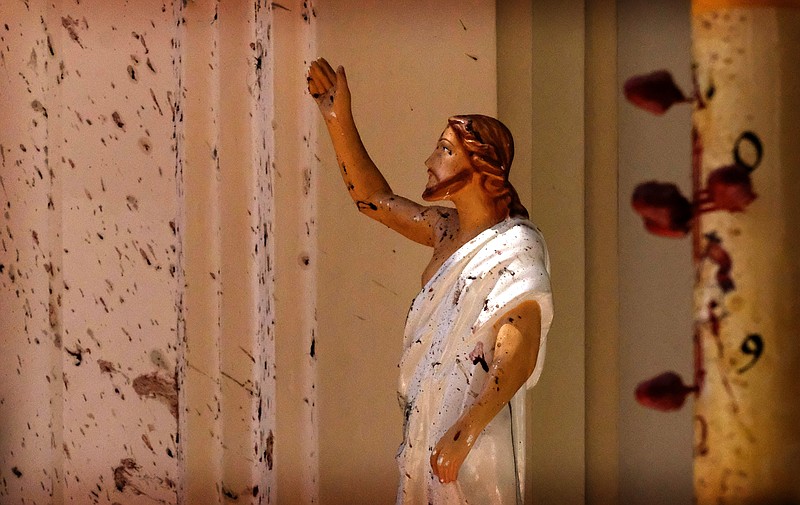COLOMBO, Sri Lanka (AP) — More than 200 people were killed and hundreds more wounded in nine bomb blasts that rocked churches, luxury hotels and other sites on Easter Sunday in Sri Lanka — the deadliest violence the South Asian island country has seen since a bloody civil war ended a decade ago.
Defense Minister Ruwan Wijewardena described the bombings as a terrorist attack by religious extremists, and police said 13 suspects were arrested, though there was no immediate claim of responsibility. Wijewardena said most of the blasts were believed to have been suicide attacks.
The explosions at three churches and three hotels — most of them in or around Colombo, the capital — collapsed ceilings and blew out windows, killing worshippers and hotel guests in one scene after another of smoke, soot, blood, broken glass, screams and wailing alarms. Victims were carried out of blood-spattered pews.
“People were being dragged out,” said Bhanuka Harischandra, of Colombo, a 24-year-old founder of a tech marketing company who was going to the city’s Shangri-La Hotel for a meeting when it was bombed. “People didn’t know what was going on. It was panic mode.”
He added: “There was blood everywhere.”
Most of those killed were Sri Lankans. However, the three bombed hotels and one of the churches, St. Anthony’s Shrine, are frequented by foreign tourists, and Sri Lanka’s Foreign Ministry said the bodies of at least 27 foreigners from a variety of countries were recovered.
The U.S. said “several” Americans were among the dead, while Britain, China and Portugal said they, too, lost citizens.
The Sri Lankan government imposed a nationwide curfew from 6 p.m.-6 a.m. and blocked Facebook and other social media, saying it needed to curtail the spread of false information and ease tension in the country of about 21 million people.
Prime Minister Ranil Wickremesinghe said he feared the massacre could trigger instability in Sri Lanka, and he vowed to “vest all necessary powers with the defense forces” to take action against those responsible.
The Archbishop of Colombo, Cardinal Malcolm Ranjith, called on Sri Lanka’s government to “mercilessly” punish those responsible “because only animals can behave like that.”
Police spokesman Ruwan Gunasekara said at least 207 people were killed and 450 wounded. He said police found a safe house and a van used by the attackers.
The scale of the bloodshed recalled the worst days of Sri Lanka’s 26-year civil war, in which the Tamil Tigers, a rebel group from the ethnic Tamil minority, sought independence from the Buddhist-majority country. The Tamils are Hindu, Muslim and Christian.
Sri Lanka, situated off the southern tip of India, is about 70 percent Buddhist. While there have been scattered incidents of anti-Christian harassment in recent years, there has been nothing on the scale of what happened Sunday.
There is also no history of violent Muslim militants in Sri Lanka. However, tensions have been running high more recently between hard-line Buddhist monks and Muslims.
Two Muslim groups in Sri Lanka condemned the church attacks, as did countries around the world, and Pope Francis expressed condolences at the end of his traditional Easter Sunday blessing in Rome.
Six nearly simultaneous blasts took place in the morning at the shrine and the Cinnamon Grand, Shangri-La and Kingsbury hotels in Colombo, as well as at two churches outside Colombo, Sri Lankan military spokesman Brig. Sumith Atapattu said.
After a lull of a few hours, two more blasts occurred just outside Colombo, one of them at a guesthouse, where two people were killed, the other near an overpass, Atapattu said.
Also, three police officers were killed during a search at a suspected safe house on the outskirts of Colombo when its occupants apparently detonated explosives to prevent arrest, authorities said.
Foreign tourists hurriedly took to their cellphones to text family and loved ones that they were OK. Visitors from around the world come to Sri Lanka to see elephants, tea plantations, ancient Buddhist monuments and other sights.
“I had a sense that the country was turning the corner, and in particular those in the tourism industry were hopeful for the future,” said tourist Peter Kelson, a technology manager from Sydney. “Apart from the tragedy of the immediate victims of the bombings, I worry that these terrible events will set the country back significantly.”
Sri Lankan forces defeated the Tamil Tiger rebels in 2009, ending a civil war that took more than 100,000 lives, with both sides accused of grave human rights violations.
Harischandra, who witnessed the attack at the Shangri-La Hotel, said there was “a lot of tension” after the bombings, but added: “We’ve been through these kinds of situations before.”
He said Sri Lankans are “an amazing bunch” and noted his social media feed was flooded with photos of people standing in long lines to give blood.

